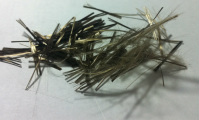General Information on Chopped Strand

Basalt chopped strand for frictional materials and for different polymer systems
Kamenny Vek company offers a special basalt chopped strand for epoxy, phenolic, vinyl ester and polyester resins. This product is mostly recommended for manufacture of frictional materials. In case of different application, special sizing composition is also possible.
Advantages and benefits:
After exposition under 400°C the Basfiber® looses only 20% of their initial strength, while strength of E glass under the same conditions drops substantially – more than 50%.
Basalt chopped strand allows you to produce stiffer and stronger details without essential increase of its price.
The dielectric properties of basalt fibers are equal to ones of glass fibers. So switch from glass to basalt does not change radar transparency.
Basalt fibers have higher sound insulation properties than glass fibers. Hence, with interior based on basalt fibers you will feel yourself more comfortable.
Product technical information:
Temperature Resistance of Basalt Fiber
Stage 1: 77 to 392 F (25 to 200 C) - amorphous fiber with sizing on the fiber surface
Stage 2: 392 to 842 F (200 to 450 C) – burning of sizing, amorphous fiber
Stage 3: 842 to 1382 F (450 to 750 C) - amorphous fiber without sizing on the fiber surface
Stage 4: 1382 to 1562 F (750 to 850 C) – transition of FeO into Fe2O3 and beginning of crystallization of Fe2O3. The fiber is becoming less and less amorphous and more and more brittle.
Stage 5: 1562 to 1922 F (850 to 1050 C) – all the Fe2O3 is in crystal form, the material is extremely brittle, its mechanical properties are extremely poor but
without stress and vibration it continues working as thermo insulation pretty good. Please note that if any kinds of jet stream take place then the weight of
material can decrease because of erosion process. In other cases the material gets different forms during different stages but the weight of material remains
the same, this the law of conservation of matter.
Stage 6: 1922 to 2282 F (1050 to 1250 C) – the beginning of melting
Product MSDS Sheets
TDS KV11 , TDS KV12 , MSDS .
TDS KV02 , TDS KV13
Now able to process all orders with Visa / MasterCard / American Express and Discover all fees will be applicable
Kamenny Vek company offers a special basalt chopped strand for epoxy, phenolic, vinyl ester and polyester resins. This product is mostly recommended for manufacture of frictional materials. In case of different application, special sizing composition is also possible.
Advantages and benefits:
After exposition under 400°C the Basfiber® looses only 20% of their initial strength, while strength of E glass under the same conditions drops substantially – more than 50%.
Basalt chopped strand allows you to produce stiffer and stronger details without essential increase of its price.
The dielectric properties of basalt fibers are equal to ones of glass fibers. So switch from glass to basalt does not change radar transparency.
Basalt fibers have higher sound insulation properties than glass fibers. Hence, with interior based on basalt fibers you will feel yourself more comfortable.
Product technical information:
Temperature Resistance of Basalt Fiber
Stage 1: 77 to 392 F (25 to 200 C) - amorphous fiber with sizing on the fiber surface
Stage 2: 392 to 842 F (200 to 450 C) – burning of sizing, amorphous fiber
Stage 3: 842 to 1382 F (450 to 750 C) - amorphous fiber without sizing on the fiber surface
Stage 4: 1382 to 1562 F (750 to 850 C) – transition of FeO into Fe2O3 and beginning of crystallization of Fe2O3. The fiber is becoming less and less amorphous and more and more brittle.
Stage 5: 1562 to 1922 F (850 to 1050 C) – all the Fe2O3 is in crystal form, the material is extremely brittle, its mechanical properties are extremely poor but
without stress and vibration it continues working as thermo insulation pretty good. Please note that if any kinds of jet stream take place then the weight of
material can decrease because of erosion process. In other cases the material gets different forms during different stages but the weight of material remains
the same, this the law of conservation of matter.
Stage 6: 1922 to 2282 F (1050 to 1250 C) – the beginning of melting
Product MSDS Sheets
TDS KV11 , TDS KV12 , MSDS .
TDS KV02 , TDS KV13
Now able to process all orders with Visa / MasterCard / American Express and Discover all fees will be applicable